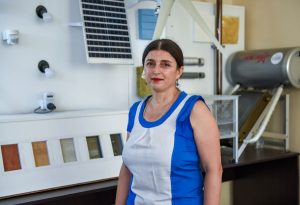In the face of growing climate challenges, Georgia is making significant strides to address environmental issues through grassroots initiatives. The Georgia Climate Action Project, launched in 2021 by CENN and funded by the European Union, has become a catalyst for change. Spanning four key regions—Kakheti, Imereti, Guria, and Racha-Lechkhumi—the four-year project aims to strengthen civil society’s role in shaping and implementing climate policies.
The program’s comprehensive structure includes four core components: policy development, research, a small grants program, and awareness-raising activities. Through these, it supports innovative projects while building the capacity of local organizations to tackle regional climate challenges.
One of the program’s most impactful components is the small grants initiative, which provided funding to 20 regional organizations to implement climate-focused projects. According to Megi Gamtkitsulashvili, Project Manager at CENN, this initiative has not only raised public awareness but also empowered local actors: “The grants allowed organizations to implement innovative ideas, such as promoting energy efficiency and renewable energy, while also building their capabilities to manage future projects.”
Turning Innovation into Action
Among the grant recipients, the Georgian Civil Development Association (SAGA) stood out with its project at Velistsikhe Public School in Kakheti. Established in 1998, SAGA has a long history of addressing environmental protection and energy efficiency in the region. Over the years, the organization has intensified its focus, and the support from CENN and the European Union enabled it to make a tangible impact.
SAGA’s project led to the creation of an Environmental Protection and Energy Efficiency Club at Velistsikhe Public School. This initiative included setting up a laboratory equipped with renewable energy devices and learning tools. The lab serves as a hands-on educational space where students engage with energy efficiency concepts in practical and meaningful ways.
“This project was an exciting opportunity for us,” explains Giorgi Bokeria, Project Manager at SAGA. “It’s not just about installing equipment; it’s about creating a culture of environmental awareness. The lab provides students with the tools to understand and explore energy efficiency, sparking curiosity and fostering a sense of responsibility toward sustainability.”

A School Leading by Example
Velistsikhe Public School’s participation in the program has transformed the way environmental topics are taught. The competition organized by SAGA and CENN offered schools the chance to win an energy efficiency laboratory—a prospect that immediately captured the interest of educators like Nana Nikolaishvili, a civic education teacher at Velistsikhe.
“The idea of a dedicated energy efficiency lab was especially appealing to us,” Nikolaishvili recalls. “We saw it as a way to make these important topics more engaging and relatable for our students.”
The lab, installed last year, is now an integral part of the school’s curriculum. Equipped with renewable energy devices and structured educational resources, it provides students with a hands-on approach to learning. Teachers also benefit from specialized training sessions, enabling them to incorporate energy efficiency into their lessons more effectively.
“We regularly hold classes in the lab, where students watch animations and documentaries on topics like renewable energy and climate change,” says Nikolaishvili. “These lessons spark meaningful discussions, and the students are eager to share what they learn with their peers outside of school.”
The initiative has also extended beyond the classroom. Training sessions were provided for teachers from other schools in the Gurjaani municipality, broadening the program’s reach and impact.
Building Capacity for Long-Term Change
The Georgia Climate Action Program is not only about immediate solutions but also about creating a foundation for lasting change. By involving regional organizations in project implementation, the program has equipped them with the skills and experience needed to manage future initiatives independently.
“The small grants program has been transformative for local organizations,” says Gamtkitsulashvili. “It’s not just about funding projects; it’s about empowering these organizations to think bigger and act with greater confidence. Many of them are now better positioned to secure additional funding and continue addressing the challenges in their communities.”
SAGA’s work at Velistsikhe Public School exemplifies how these efforts can yield long-term benefits. The school’s energy efficiency club has become a model for engaging young people in environmental topics, demonstrating the potential of education to drive cultural change.
A Model for Regional Climate Action
The grants program of the Georgia Climate Action Project showcases how localized solutions can effectively tackle global challenges. By fostering collaboration between civil society organizations, schools, and international donors, the program has created a blueprint for sustainable development that other regions can emulate.
As Bokeria puts it, his project „is about more than solving today’s problems. It’s about planting the seeds for a sustainable future, where communities are equipped to lead the way in addressing climate challenges.”
Through projects like the one at Velistsikhe, Georgia is not only addressing the urgent need for climate action but also inspiring a new generation to take up the cause. The result is a more informed, engaged, and empowered society—one ready to face the challenges of tomorrow with resilience and innovation.














